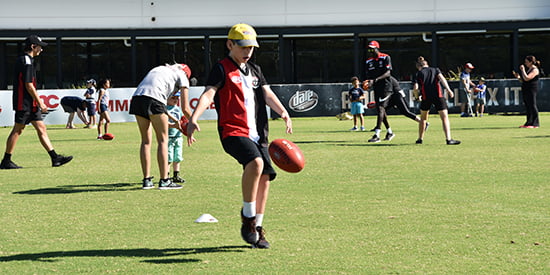Deakin study shows benefits of Auskick program for kids with autism
Media releaseNew Deakin University research shows simple adaptions to the NAB AFL Auskick program can encourage kids with Autism Spectrum Disorder (ASD) to increase physical activity and join in with their peers.
The study, recently published in the Journal of Motor Learning and Development, explored parent experiences of, and influences on, child participation in an 11-week AFL Auskick football program adapted for children with ASD, as well as changes in the child's motor skills.
The program is part of Deakin inclusion initiative ALLPlay, and was a collaboration with the AFL designed to encourage greater Auskick participation for children of all abilities.
ALLPlay creator and director of the Deakin Child Study Centre, Professor Nicole Rinehart, said numerous barriers existed for children with ASD to engage in sporting activities, including behavioural problems and motor deficits.
"We know that young people with ASD engage in less physical activity than their peers," Professor Rinehart said.
"Most parents reported that the barriers to their children participating in sporting activity included a preference for electronic media devices, poor motor skills, sensory issues and anxiety.
"Yet sports participation can provide huge benefits beyond just physical exercise and better motor skills, such as improved psychological health and social functioning due to the social aspects of participation."
Adaptions as part of the inclusive Auskick program included changing the length of the activities, having more activity repetitions to learn new skills, allowing breaks for children to unwind and calm down if needed, and using visual instructions and schedules.
Lead researcher Dr Tamara May, a Senior Research Fellow in Deakin's School of Psychology, said other important inclusive factors were using smaller groups, matching children on similar levels, allowing children to go at their own pace and having their parents involved as much as they needed.
"There was a hugely positive response from parents regarding the program," Dr May said.
"Many parents were delighted their children could engage in Auskick just like any other child, and reap the many benefits."
ASD is now reported to affect 2 to 3 per cent of Australian children.
Professor Rinehart said 180,000 primary school aged children currently participated in AFL Auskick nationally, and kids with ASD deserved to be a part of that too.
"All children deserve the opportunity to participate in such a program, regardless of their disability," she said.
"Parents identified a number of flow on benefits from participation, suggesting the skills gained could be carried across into other settings too.
"These included parent reports of their children being able to play with other children in the school environment following their involvement in the football program.
"It also provided opportunities for fathers to interact with, and be involved in, the development of their child with ASD. This is particularly important as we find this kind of work is often shouldered primarily by mums."
Moose Toys is a major partner of ALLPlay. Support for this project was also provided by Geelong Community Foundation.

